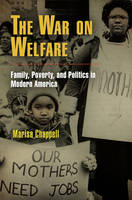
The War on Welfare
Family, Poverty, and Politics in Modern America
Seiten
2009
University of Pennsylvania Press (Verlag)
978-0-8122-4204-1 (ISBN)
University of Pennsylvania Press (Verlag)
978-0-8122-4204-1 (ISBN)
- Keine Verlagsinformationen verfügbar
- Artikel merken
Focusing on the fate of the federal Aid to Families with Dependent Children (AFDC) program, this comprehensive history of the thirty year war over welfare shows how stubborn allegiance to the male-headed household undermined the struggle for economic justice.
Why did the War on Poverty give way to the war on welfare? Many in the United States saw the welfare reforms of 1996 as the inevitable result of twelve years of conservative retrenchment in American social policy, but there is evidence that the seeds of this change were sown long before the Reagan Revolution—and not necessarily by the Right.
The War on Welfare: Family, Poverty, and Politics in Modern America traces what Bill Clinton famously called "the end of welfare as we know it" to the grassroots of the War on Poverty thirty years earlier. Marshaling a broad variety of sources, historian Marisa Chappell provides a fresh look at the national debate about poverty, welfare, and economic rights from the 1960s through the mid-1990s. In Chappell's telling, we experience the debate over welfare from multiple perspectives, including those of conservatives of several types, liberal antipoverty experts, national liberal organizations, labor, government officials, feminists of various persuasions, and poor women themselves.
During the Johnson and Nixon administrations, deindustrialization, stagnating wages, and widening economic inequality pushed growing numbers of wives and mothers into the workforce. Yet labor unions, antipoverty activists, and moderate liberal groups fought to extend the fading promise of the family wage to poor African Americans families through massive federal investment in full employment and income support for male breadwinners. In doing so, however, these organizations condemned programs like Aid to Families with Dependent Children (AFDC) for supposedly discouraging marriage and breaking up families. Ironically their arguments paved the way for increasingly successful right-wing attacks on both "welfare" and the War on Poverty itself.
Why did the War on Poverty give way to the war on welfare? Many in the United States saw the welfare reforms of 1996 as the inevitable result of twelve years of conservative retrenchment in American social policy, but there is evidence that the seeds of this change were sown long before the Reagan Revolution—and not necessarily by the Right.
The War on Welfare: Family, Poverty, and Politics in Modern America traces what Bill Clinton famously called "the end of welfare as we know it" to the grassroots of the War on Poverty thirty years earlier. Marshaling a broad variety of sources, historian Marisa Chappell provides a fresh look at the national debate about poverty, welfare, and economic rights from the 1960s through the mid-1990s. In Chappell's telling, we experience the debate over welfare from multiple perspectives, including those of conservatives of several types, liberal antipoverty experts, national liberal organizations, labor, government officials, feminists of various persuasions, and poor women themselves.
During the Johnson and Nixon administrations, deindustrialization, stagnating wages, and widening economic inequality pushed growing numbers of wives and mothers into the workforce. Yet labor unions, antipoverty activists, and moderate liberal groups fought to extend the fading promise of the family wage to poor African Americans families through massive federal investment in full employment and income support for male breadwinners. In doing so, however, these organizations condemned programs like Aid to Families with Dependent Children (AFDC) for supposedly discouraging marriage and breaking up families. Ironically their arguments paved the way for increasingly successful right-wing attacks on both "welfare" and the War on Poverty itself.
Marisa Chappell teaches history at Oregon State University.
List of Acronyms
Introduction
One: Reconstructing the Black Family: The Liberal Antipoverty Coalition in the 1960s
Two: Legislating the Male-Breadwinner Family: The Family Assistance Plan
Three: Building a New Majority: Welfare and Economic Justice in the 1970s
Four: Debating the Family Wage: Welfare Reform in the Carter Administration
Five: Relinquishing Responsibility for Poor Families: Reagan's Family Wage for the Wealthy
Conclusion: Beyond the Family Wage
Notes
Index
Acknowledgments
| Erscheint lt. Verlag | 19.11.2009 |
|---|---|
| Reihe/Serie | Politics and Culture in Modern America |
| Zusatzinfo | 16 illus. |
| Verlagsort | Pennsylvania |
| Sprache | englisch |
| Maße | 152 x 229 mm |
| Themenwelt | Geisteswissenschaften ► Geschichte ► Regional- / Ländergeschichte |
| Sozialwissenschaften ► Soziologie | |
| ISBN-10 | 0-8122-4204-1 / 0812242041 |
| ISBN-13 | 978-0-8122-4204-1 / 9780812242041 |
| Zustand | Neuware |
| Haben Sie eine Frage zum Produkt? |
Mehr entdecken
aus dem Bereich
aus dem Bereich
Erinnerungen
Buch | Softcover (2024)
Pantheon (Verlag)
16,00 €


